21 Healthiest Fruits To Eat According to a Nutritionist in 2026
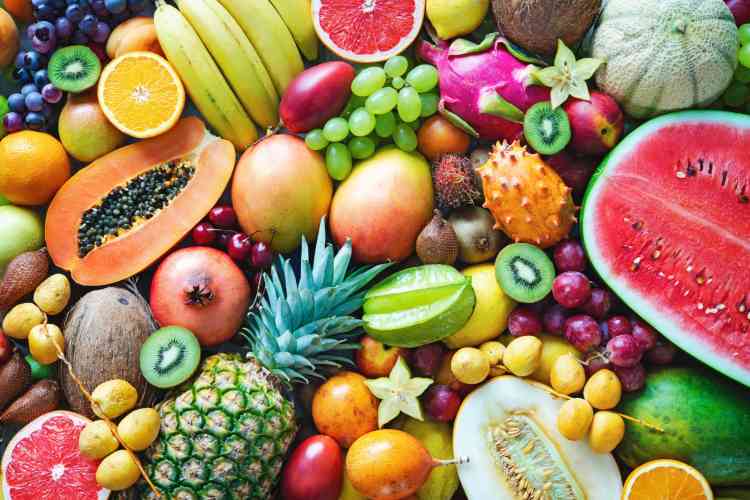
When trying to eat more healthily, discovering the healthiest fruits can make all the difference. While some fruits are naturally higher in sugar, whole fruit remains one of the best choices you can make, “nature’s candy” that you can enjoy every day.
As Harvard Health explains, whole fruit is a healthy daily choice for most people because fiber and water slow sugar absorption. The National Heart, Lung and Blood Institute also ranks fruit among the best foods for heart health.
Fruit provides fiber, antioxidants and vitamins such as vitamin C, underscoring its strong nutrition profile. While pretty much any fruit you pick up will be a healthy snack, knowing which are the healthiest fruits is always helpful when trying to optimize your diet.
In this nutritionist-approved guide, we'll cover the 21 healthiest fruits, including those best for different dietary needs, such as increased intake of fiber or certain vitamins. From classic apples, pears and oranges to tropical delights like papaya, mango and açaí, get ready to delve into the delicious world of healthy fruits!
Jump to Section
21 Most Healthy Fruits to Eat
1. Pomegranates
You may have heard pomegranates called a superfood and it’s true! As Harvard Health notes, they’re one of the healthiest fruits due to their high antioxidant content, which contributes to anti-inflammatory effects. Diets rich in antioxidants have been linked to lower risks of cognitive decline, cholesterol buildup and certain chronic diseases.
According to UCLA Health, pomegranates also have antimicrobial properties that may help protect oral health by reducing the growth of bacteria linked to gum disease and bad breath. They provide vitamin C, potassium and polyphenols that support overall health.
The best way to enjoy pomegranates is to eat the seeds whole, which preserves fiber and nutrients. Sprinkle them over salads or enjoy as a snack. If drinking juice, choose 100% pure pomegranate juice, keeping in mind it will contain less fiber than the whole fruit.
Pomegranate Nutritional Info (per 282-gram fruit)
- Calories: 234
- Total Fat: 3.3 grams
- Carbohydrates: 52 grams
- Dietary Fiber: 11.3 grams
- Total Sugar: 38.6 grams
- Protein: 4.7 grams
Pomegranates Are a Good Source Of:
- Iron
- Potassium
- Magnesium
- Folate
- Vitamin C
- Vitamin K
- Vitamin E
Recipes With Pomegranate:
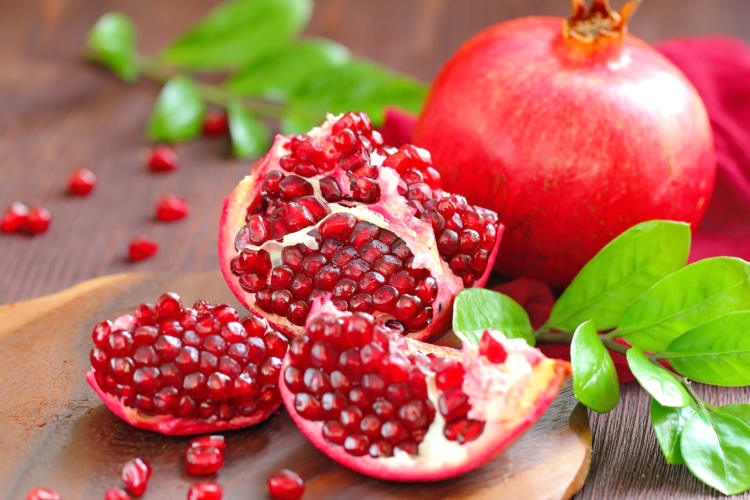
2. Blueberries
Low in calories and sugar and packed with nutrients, blueberries are often cited by sources such as the National Library of Medicine as one of the healthiest fruits. They’re rich in fiber, antioxidants and polyphenols, which may help reduce oxidative stress in the body and support brain health.
Blueberries are often highlighted as a food that relieves stress because the anti-inflammatory properties connected with antioxidants help combat oxidative damage in the body. Blueberries are also a good source of vitamins C and E, as well as folate, contributing to overall health.
While they won’t guarantee graceful aging, including them in your diet can support cognitive function and cellular health over time. Plus, there are many ways to incorporate this healthy fruit into your diet. From snacking on them as they come to adding to salads and smoothies, there's no shortage of ways to enjoy blueberries.
Blueberries Nutritional Info (per 100-gram serving)
- Calories: 57
- Total Fat: <1 gram
- Carbohydrates: 14.6 grams
- Dietary Fiber: 2.4 grams
- Total Sugar: 9.36 grams
- Protein: <1 gram
Blueberries Are a Good Source Of:
- Folate
- Vitamin C
- Vitamin E
Recipes With Blueberries:
3. Blackberries
Rich in vitamins C and K, manganese and fiber, among other nutrients, blackberries are one of the most nutritious fruits you can eat. As News Medical Life Sciences explains, they contain heart-healthy compounds called anthocyanins, which have antioxidant and anti-inflammatory properties that may help protect against cardiovascular disease, type 2 diabetes and certain cancers.
Like all the healthiest fruits, they’re low in calories and sugar, but their high fiber content will keep you feeling full. In season, few healthy snacks can beat juicy and nutrient-rich blackberries. They can also be enjoyed with both sweet and savory dishes, such as in a salad with goat cheese, therefore making them easy to incorporate into your daily meal plans.
Blackberries Nutritional Info (per 100-gram serving)
- Calories: 43
- Total Fat: <1 gram
- Carbohydrates: 9.61 grams
- Dietary Fiber: 5.3 grams
- Total Sugar: 4.9 grams
- Protein: 1.5 grams
Blackberries Are a Good Source Of:
- Magnesium
- Potassium
- Zinc
- Folate
- Vitamin C
- Vitamin A
- Vitamin K
- Vitamin E

4. Apples
Okay, so it may not keep the doctor away more than any other fruit, but there’s a good reason for the old adage. Fiber-rich apples promote healthy digestion and it’s hard to find a more filling snack with fewer calories than a big, crisp apple.
That fiber content can help stabilize your blood sugar and cholesterol and since a large apple is so filling, it’s a great choice for managing calorie intake without sacrificing nutrients. This also means they are one of the healthiest fruits for weight management.
As WebMD explains, apples are linked to better gut health and may support overall wellness, thanks to their fiber, antioxidants and phytonutrients. As with other options on this list of the healthiest fruits, there are also many ways to enjoy apples.
You can eat them as a snack, alone or with healthy peanut butter, add them to savory dishes like salads and stew or bake them with a natural sweetener like honey, maple syrup or agave. Their wide availability and portability make them one of the healthiest gas station snacks as well; perfect for getting some nutrients during a long road trip.
Apple Nutritional Info (per medium 182-gram fruit with skin)
- Calories: 95
- Total Fat: <1 gram
- Carbohydrates: 25.1 grams
- Dietary Fiber: 4.4 grams
- Total Sugar: 19 grams
- Protein: <1 gram
Apples Are a Good Source Of:
- Vitamin C
- Potassium
Recipes With Apples:
5. Papaya
This one’s not quite as easy to find as most of the other options on this list of the healthiest fruits but no roundup of the most nutritious fruits would be complete without it.
Papaya is nutrient-rich, high in fiber, potassium and lycopene, an antioxidant linked to lower cardiovascular risk. The American Heart Association notes that potassium can help prevent or treat high blood pressure and research from the National Library of Medicine highlights lycopene’s role in cardiovascular disease prevention. These nutrients make papaya a smart choice for supporting heart health and managing blood pressure.
According to the Mayo Clinic, papaya is also one of the most folate-rich fruits. Folate (vitamin B9) helps the body produce red blood cells and supports healthy cell growth and function. It’s especially important during early pregnancy but beneficial for everyone.
Opt for ripe orange papaya for its folate content. Unripe papaya is typically avoided during pregnancy because it contains latex, which may stimulate contractions. If pregnancy is a concern, stick to ripe papaya or other folate-rich fruits like citrus, berries and melons.
If you spot papaya at the store, it’s easy to add to your diet. Enjoy it fresh as a snack with a squeeze of lime or blend it into fruit salads and smoothies. For savory dishes, making popular Thai food papaya salad (which uses unripe, green papaya) is an excellent choice.
Papaya Nutritional Info (per 100-gram serving)
- Calories: 43
- Total Fat: <1 gram
- Carbohydrates: 10.8 grams
- Dietary Fiber: 1.7 grams
- Total Sugar: 7.8 grams
- Protein: <1 gram
Papayas Are a Good Source Of:
- Magnesium
- Potassium
- Folate
- Vitamin C
- Vitamin A
- Vitamin K
- Vitamin E
- Lycopene
Recipes With Papaya:
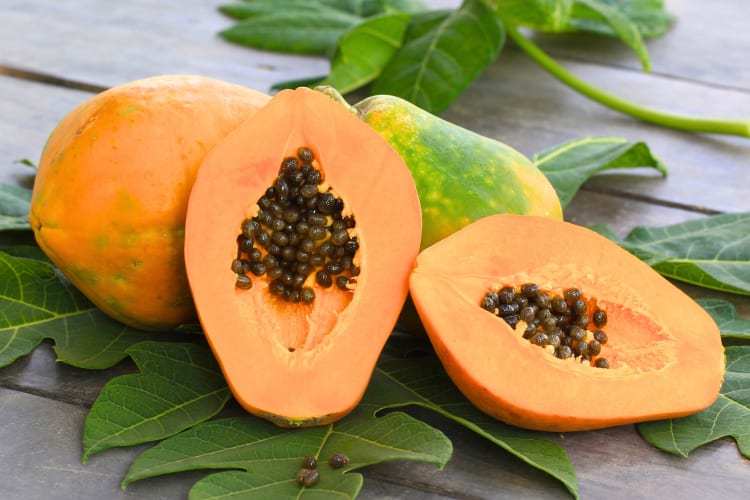
6. Cherries
Most people associate the health benefits of cherries unsentimentally with that gross-tasting medicine from their childhoods, but they really do deserve a better reputation. Their high antioxidant and potassium content make cherries one of the healthiest fruits and one of the tastiest too, if you can get past any issues connected to the artificial-tasting equivalent!
Cherries provide potassium, fiber and antioxidants. Research from the Cleveland Clinic highlights tart cherries for their anti-inflammatory properties, potential support for exercise recovery and possible benefits for sleep quality.
The best way to enjoy cherries is generally fresh without any added ingredients. However, they can also be added to salads and smoothies. While not the healthiest option, you can also make them into jams or use them in desserts.
Cherries Nutritional Info (per 100-gram serving)
- Calories: 63
- Total Fat: <1 gram
- Carbohydrates: 16.2 grams
- Dietary Fiber: 1.6 grams
- Total Sugar: 14 grams
- Protein: 1 gram
Cherries Are a Good Source Of:
- Iron
- Magnesium
- Potassium
- Folate
- Vitamin C
- Vitamin A
- Vitamin E
Recipes With Cherries:
7. Strawberries
Did you know that strawberries are as rich in vitamin C as oranges? In fact, 100 grams of strawberries can contain slightly more vitamin C than the same amount of oranges, making them one of the healthiest fruits you can eat.
Along with having around 59 milligrams (~65% DV) of vitamin C per 100 grams, strawberries are low in sugar and calories and are packed with antioxidants, vitamins and minerals.
On top of that, they’re probably the most delicious fruit on the planet if you eat them in peak season. And the good news? With all those health benefits, no one can tell you not to eat the entire carton at once!
Strawberries Nutritional Info (per 100-gram serving)
- Calories: 32
- Total Fat: <1 gram
- Carbohydrates: 8 grams
- Dietary Fiber: 2 grams
- Total Sugar: 5 grams
- Protein: <1 gram
Strawberries Are a Good Source Of:
- Iron
- Folate
- Vitamin C
- Vitamin E
Recipes With Strawberries:

8. Peaches
Peaches are packed with antioxidants like vitamin C and carotenoids, making them one of the healthiest fruits and a tasty way to support overall skin health. While they won’t replace sunscreen, these compounds help the body combat oxidative stress caused by free radicals.
They’re additionally filling and fiber-packed; in fact, in traditional Chinese medicine, peaches are used to treat digestive problems. And, this benefit is backed up by modern science, with sources like WebMD highlighting how peaches benefit digestion. Just make sure they’re unpeeled because much of the fiber is in a peach’s skin.
Peaches provide nutrients that support eye health and collagen production, which aids tissue repair. What's best about this healthy fruit is that it's delicious when in season and can be used in many recipes, along with being eaten as is. Whether you add peach slices to a salad or use them as a topping with some of the healthiest ice cream, you'll get a tasty meal with added nutrition.
Peaches Nutritional Info (per 147-gram fruit)
- Calories: 62
- Total Fat: <1 gram
- Carbohydrates: 14.5 grams
- Dietary Fiber: 2.2 grams
- Total Sugar: 12.3 grams
- Protein: 1.3 grams
Peaches Are a Good Source Of:
- Iron
- Magnesium
- Potassium
- Folate
- Vitamin C
- Vitamin A
- Vitamin E
Recipes With Peaches:
9. Oranges
Oranges offer many health benefits, along with being one of the most popular options on this list of the healthiest fruits. Notably, vitamins are one of the things that make oranges one of the healthiest fruits.
Oranges are especially rich in vitamin C, making them one of the best foods that boost the immune system and also provide folate, potassium and small amounts of calcium and magnesium.
Whole oranges supply fiber, while calcium-fortified orange juice offers more calcium but less fiber. The International Osteoporosis Foundation highlights oranges as one of the best fruits to eat to increase calcium intake.
Oranges Nutritional Info (per 140-gram fruit)
- Calories: 65
- Total Fat: <1 gram
- Carbohydrates: 16.5 grams
- Dietary Fiber: 2.8 grams
- Total Sugar: 12 grams
- Protein: 1.3 grams
Oranges Are a Good Source Of:
- Vitamin C
- Folate
- Potassium
Recipes With Oranges:
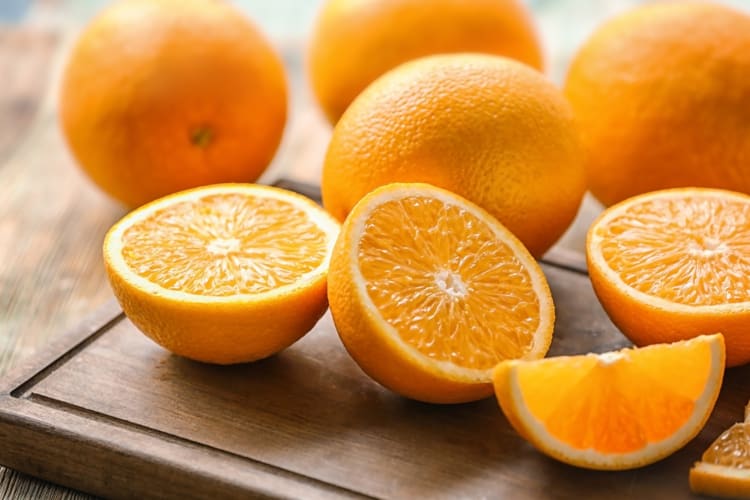
10. Apricots
When it comes to apricots, the eyes have it. These small but mighty orange stone fruits are among the healthiest fruits, in part because they’re rich in vitamin A, which is essential for healthy vision.
As the American Academy of Ophthalmology states, most orange colored fruits and vegetables are rich in vitamin A, mentioning apricots as well as cantaloupe as top fruits to eat to get more of this nutrient.
Plus, since they’re 85% water, apricots are great for hydration. They’re low in calories and sugar as well, making them a knockout on the fruit scene.
Apricots Nutritional Info (per 50-gram fruit)
- Calories: 24
- Total Fat: <1 gram
- Carbohydrates: 5 grams
- Dietary Fiber: 1 gram
- Total Sugar: 3 grams
- Protein: <1 gram
Apricots Are a Good Source Of:
- Calcium
- Iron
- Magnesium
- Potassium
- Vitamin C
- Vitamin A
- Vitamin K
- Vitamin E
11. Raspberries
When it comes to the healthiest fruits, raspberries easily make the list. While they only contain small amounts of plant-based omega-3 fatty acids (ALA), they still contribute to a heart-healthy diet when eaten alongside other omega-3 sources such as walnuts, flaxseeds or oily fish.
These vibrant berries are also packed with fiber, which supports digestion and helps maintain healthy cholesterol levels. According to WebMD, raspberries are rich in manganese — a mineral that supports bone health, skin repair and blood sugar regulation.
Add to that their impressive dose of antioxidants and vitamin C and it’s clear why raspberries are one of the healthiest fruits to enjoy daily. They’re a sweet, nutrient-dense snack that supports your heart, skin and overall well-being.
Raspberries Nutritional Info (per 100-gram serving)
- Calories: 55
- Total Fat: <1 gram
- Carbohydrates: 13 grams
- Dietary Fiber: 6.5 grams
- Total Sugar: 2.7 grams
- Protein: 1 gram
Raspberries Are a Good Source Of:
- Vitamin C
- Manganese
- Vitamin K
Recipes With Raspberries:

12. Açaí
Açaí is one of the trendiest foods out there right now, with the much-loved superfood making constant appearances in smoothie bowls nationwide, but the hype it gets as one of the world’s healthiest fruits isn’t unwarranted.
Sure, you might kill the low-calorie idea a little by throwing a huge bowl of the stuff together with all kinds of toppings and sweeteners, but the açaí berry is nutrient-dense, higher in healthy fats than most fruits and rich in polyphenols. Commercial açaí bowls can be high in added sugars, so check ingredients.
Since açaí berries don’t travel well, they’re sold in frozen pulp or juice forms in the U.S., but that won’t change any of the properties that make them one of the healthiest fruits.
Açaí Nutritional Info (per 100-gram serving)
- Calories: 75
- Total Fat: 6.3 grams
- Carbohydrates: 5.4 grams
- Dietary Fiber: 3.8 grams
- Total Sugar: 1.1 grams
- Protein: 1 gram
Açaí Is a Good Source Of:
- Magnesium
- Potassium
- Zinc
- Vitamin C
- Vitamin A
- Vitamin E
13. Grapes
You may hear “grapes” and think “wine,” or even “raisins,” but there’s much more to their raw form than you might assume. Grapes are one of the healthiest fruits for their richness in copper, vitamin K and B vitamins. What’s more, they’ll help you stay hydrated with their high water content.
As explained by Medical News Today, other benefits of grapes include them being a good source of fiber and possibly helping to manage blood pressure. Their antioxidants, including polyphenols, contribute to overall health and may help reduce the risk of chronic diseases.
Grapes are higher in natural sugars than some fruits, but their glycemic index is moderate. Portion awareness helps if you monitor blood sugar.
Ever been tempted to grab a whole bundle of grapes and eat them one by one while luxuriating on the couch like some ancient Greek philosopher? Live your time-travel dreams, friend. Enjoying one of the healthiest fruits around is a simple way to add nutrients—and a little joy—to your day.
Grapes (green, seedless) Nutritional Info (per 100-gram serving)
- Calories: 80
- Total Fat: <1 gram
- Carbohydrates: 18 grams
- Dietary Fiber: 1 gram
- Total Sugar: 16 grams
- Protein: <1 gram
Grapes Are a Good Source Of:
- Potassium
- Folate
- Vitamin C
- Vitamin A
- Vitamin K
- Vitamin E
Recipes With Grapes:
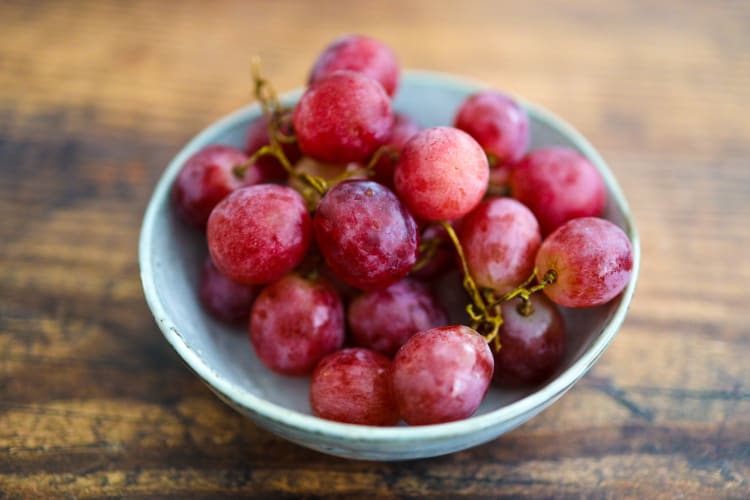
14. Dates
Dates, the sophisticated older cousin of prunes, are fiber-rich and contain inflammation-fighting flavonoids and polyphenols. Because they are calorie- and sugar-dense, it’s best to enjoy them in small portions.
They make a perfect natural sweetener for smoothies, desserts and baked goods or a quick nutrient-rich snack on their own. Pairing them with a small amount of protein, like nuts or the healthiest dark chocolate, can help balance blood sugar while still letting you enjoy their sweet, satisfying flavor.
Dates Nutritional Info (per 50-gram serving)
- Calories: 141
- Total Fat: <1 gram
- Carbohydrates: 37.5 grams
- Dietary Fiber: 4 grams
- Total Sugar: 35.1 grams
- Protein: 1.3 grams
Dates Are a Good Source Of:
- Magnesium
- Potassium
- Copper
Recipes With Dates:
15. Grapefruit
Grapefruit has a sour reputation as…well, a health food. The kind your grandma would eat for breakfast before a brisk walk, probably with cottage cheese and a boiled egg.
Dare to overlook the icky childhood connotations, though and you’ll find that grandma was sort of right: grapefruit really is one of the healthiest fruits. It’s most notably rich in vitamin C — according to Johns Hopkins Medicine, a medium grapefruit provides about 100% of your daily needs — but it’s also high in fiber, low in calories and water-rich for hydration.
Grapefruit can be a healthy breakfast ally if you can learn to enjoy its tart flavor. Just keep in mind that grapefruit can interact with some medications, including certain statins and blood pressure drugs.
Grapefruit Nutritional Info (per half a fruit)
- Calories: 52
- Total Fat: <1 gram
- Carbohydrates: 13.2 grams
- Dietary Fiber: 2 grams
- Total Sugar: 8.5 grams
- Protein: 1 gram
Grapefruit Is a Good Source Of:
- Magnesium
- Potassium
- Folate
- Vitamin C
- Vitamin A
Recipes With Grapefruit:
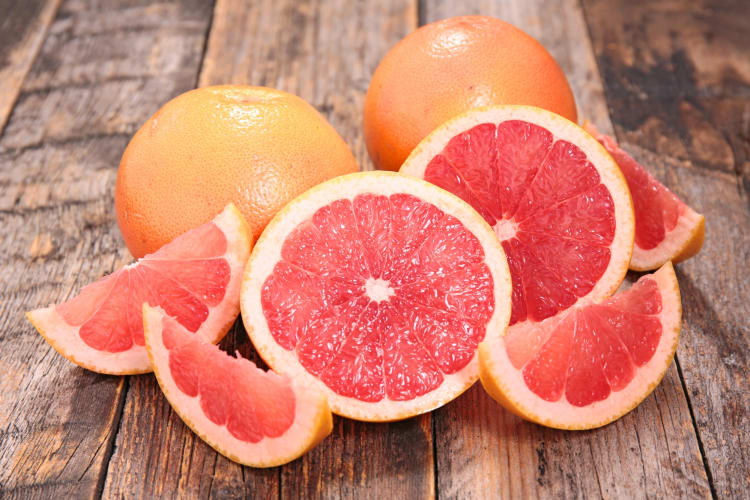
16. Pineapple
Pineapple is a tropical powerhouse and one of the healthiest fruits you can enjoy. Its unique enzyme, bromelain, helps break down proteins and may support digestion, which is why it can feel a little tangy or “sting” when eaten.
According to The Nutrition Source, pineapple is also one of the best dietary sources of manganese, a mineral essential for bone health, metabolism and antioxidant defense. It’s rich in vitamin C as well, which contributes to normal immune function, making pineapple a nutrient-dense addition to your diet.
Pineapple Nutritional Info (per 100-gram serving)
- Calories: 50
- Total Fat: <1 gram
- Carbohydrates: 13.1 grams
- Dietary Fiber: 1.4 grams
- Total Sugar: 9.85 grams
- Protein: <1 gram
Pineapple Is a Good Source Of:
- Magnesium
- Potassium
- Folate
- Vitamin C
- Vitamin A
- Vitamin E
Recipes With Pineapple:
17. Watermelon
Watermelon is many people's favorite fruit, but is watermelon healthy? As you probably guessed, it is!
It should be no surprise that watermelon is a hydration superstar among the healthiest fruits around. Along with its high water content, this summer staple has some fiber to aid in healthy digestion. It also provides lycopene and small amounts of B vitamins.
All of those things make watermelon not just a worthy summer BBQ favorite, but also one of the healthiest fruits you can eat. If you’re adding a new exercise routine to your health plans, watermelon (specifically watermelon juice, as stated in a study published on the National Library of Medicine) has also been found to reduce muscle soreness and aid in exercise recovery.
Watermelon Nutritional Info (per 286-gram wedge)
- Calories: 86
- Total Fat: <1 gram
- Carbohydrates: 22 grams
- Dietary Fiber: 1.1 grams
- Total Sugar: 18 grams
- Protein: 1.7 grams
Watermelon Is a Good Source Of:
- Magnesium
- Potassium
- Folate
- Lycopene
- Vitamin C
- Vitamin A
- Vitamin B6
- Vitamin B5
- Vitamin B1
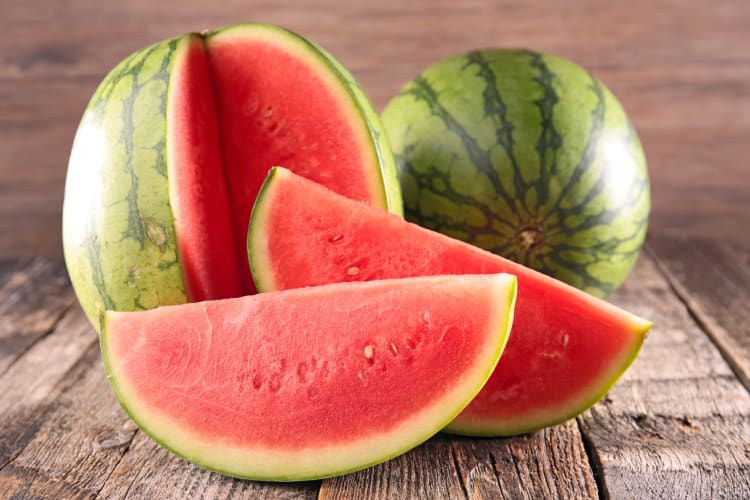
18. Banana
You’ve definitely heard that bananas are one of the healthiest fruits around — likely because they’re so well-known for being high in potassium. And that’s true: potassium supports muscle and nerve function, making them a convenient pre- or post-workout choice. But are bananas healthy beyond that?
Bananas provide carbohydrates along with fiber, and slightly underripe ones contain more resistant starch, which supports gut health. They also offer vitamin B6 and vitamin C.
Budget friendly and widely available, they belong among the healthiest cheap foods. Pair them with some of the best natural peanut butter and you also have a balanced and healthy snack for kids and adults alike.
Bananas Nutritional Info (per 1 medium 118-gram fruit)
- Calories: 105
- Total Fat: <1 gram
- Carbohydrates: 27 grams
- Dietary Fiber: 3.1 grams
- Total Sugar: 14 grams
- Protein: 1.3 grams
Bananas Are Also a Good Source Of:
- Magnesium
- Potassium
- Folate
- Biotin
- Vitamin C
Recipes With Banana:
- Banana Popsicles
- Banana Zucchini Bread
- Almond Flour Banana Muffins
- Gluten-Free Banana Muffins
- Chia Seed Smoothie
19. Mango
If you’re looking for one of the healthiest fruits that’ll keep you feeling full, make it mango. As the American Heart Association explains, mango's fiber content helps promote satiety, making it a great choice for weight management.
Mangoes provide an impressive amount of vitamin C, along with smaller amounts of many other essential nutrients and they’re rich in antioxidants that support overall health and may help reduce inflammation.
Additionally, according to the Cleveland Clinic, eating mango can support gut health and may help maintain healthy cholesterol levels. At around 60 calories per 100 grams, they’re a nutrient-dense fruit you can enjoy regularly without significantly impacting your daily calorie intake.
Mango Nutritional Info (per 100-gram serving)
- Calories: 60
- Total Fat: <1 gram
- Carbohydrates: 15 grams
- Dietary Fiber: 1.6 grams
- Total Sugar: 14 grams
- Protein: <1 gram
Mango Is Also a Good Source Of:
- Iron
- Magnesium
- Potassium
- Folate
- Vitamin C
- Vitamin A
- Vitamin K
- Vitamin E
Recipes With Mango:
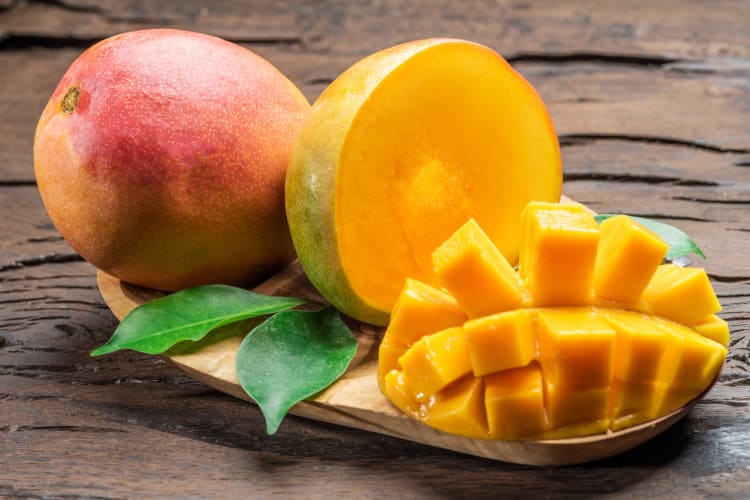
20. Pears
Pears are a meatier fruit than most, so you might’ve found yourself reaching for one on an empty stomach. If you have, that was a good impulse: their antioxidant richness and fiber make pears one of the healthiest fruits you could choose when you want a filling and healthy snack.
Green-skinned pears even include hard-to-get compounds that promote eye health. Additionally, Medical News Today explains that pears contain high levels of antioxidants, which can help the body fight free radicals.
The fiber in pears also supports healthy digestion and may help maintain cardiovascular health. With so many varieties available, it’s easy to enjoy this nutrient-dense fruit regularly without getting bored.
Pear Nutritional Info (per 166-gram fruit)
- Calories: 95
- Total Fat: <1 gram
- Carbohydrates: 25 grams
- Dietary Fiber: 5.1 grams
- Total Sugar: 16.3 grams
- Protein: <1 gram
Pears Are Also a Good Source Of:
- Magnesium
- Potassium
- Vitamin C
- Vitamin K
- Vitamin E
- Folate (specifically Asian pears)
Recipes With Pears:
21. Kiwi
This fuzzy superfruit is notable for its high concentration of vitamin K, which supports bone health — so if you’re concerned about osteoporosis, reach for a kiwi next time you need a snack.
Kiwis are also high in fiber, promoting gut health and supporting weight management. They provide vitamin E, which contributes to heart and immune health and potassium, which is important for muscle, nerve, kidney and heart function.
An excellent source of vitamin C, kiwis can be eaten with the skin on for extra fiber. Small in size but nutrient-dense, these tasty fruits truly pack a big nutritional punch, making them one of the healthiest fruits around.
Kiwi Nutritional Info (per 100-gram fruit)
- Calories: 60
- Total Fat: <1 gram
- Carbohydrates: 15 grams
- Dietary Fiber: 2.5 grams
- Total Sugar: 9 grams
- Protein: 1.1 grams
Kiwis Are Also a Good Source Of:
- Calcium
- Magnesium
- Potassium
- Folate
- Vitamin C
- Vitamin K
- Vitamin E
Recipes With Kiwi:
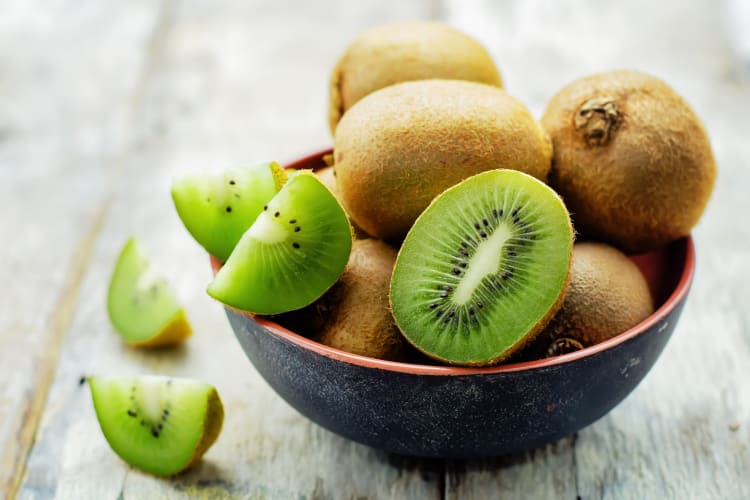
What Is the Healthiest Fruit?
Okay, so there are tons of healthy fruits out there — got that. But what is the healthiest fruit? Ultimately, the most beneficial fruit to eat depends on various factors, including what vitamins and nutrients you're looking to gain.
In general, fruits with the lowest calories, highest fiber content and lowest natural sugar content could be considered the best fruits to eat. While there’s no clear winner, fruits like blueberries and kiwi rank high due to fiber, water content and polyphenols. The best pick depends on your goals.
If you're looking to boost your intake of certain vitamins and nutrients, this will play a role as well in determining which is the healthiest fruit for you. For example, if you want to increase your vitamin C intake, oranges or strawberries are a good choice. Alternatively, if you would like some extra omegas in your diet, turn to raspberries.
The following can be used as a guide if trying to increase intake of certain vitamins and minerals commonly found in healthy fruits, with these being the best sources:
Vitamin C
- Citrus Fruits
- Strawberries
- Kiwi
Vitamin A
- Mango
- Papaya
- Cantaloupe
- Dried Apricots
Potassium
- Oranges
- Pomegranates
- Bananas
- Cherries
- Raspberries
Folate
- Mango
- Oranges
- Papaya
- Strawberries
- Kiwi
With so many great options offering a range of health benefits, if you’re looking to work the most nutritious fruits into your diet, the smartest strategy is to eat a variety of them. We find this is the tastiest method as well!
Aim for about 2 cups of fruit per day and choose a variety of types and colors. Just remember that the whole fruit is always best. Fruit juice lacks fiber and concentrates sugars compared with whole fruit, which reduces some benefits.
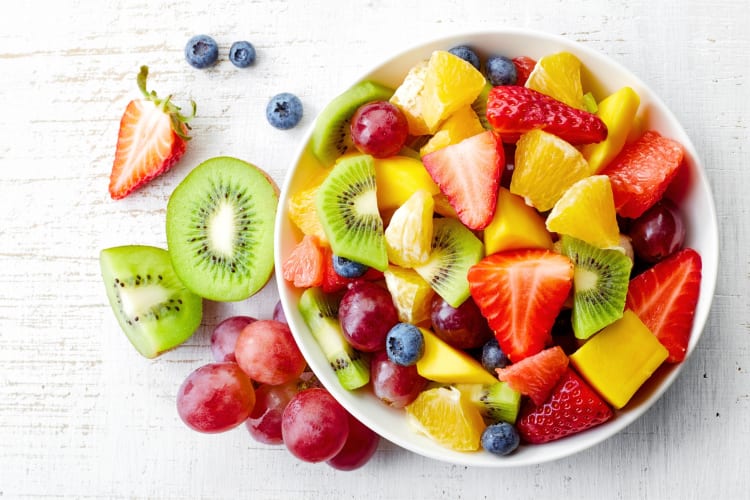
How We Choose the Healthiest Fruits
Before we get to answering the question: “What is the best fruit to eat?”, let’s take a look at the research process that was followed to create this guide.
With over 10 years of experience in the culinary industry, the team at Cozymeal has an in-depth knowledge of various food-related topics, including nutrition. The editorial team has also created a range of articles around these subjects that are valuable to readers and include well-researched, trustworthy and accurate information.
This experience set the foundation for creating this guide to the healthiest fruits. Specifically, we undertook thorough research to find fruits with the best nutritional profile, which includes being high in fiber, vitamins and minerals.
We additionally made sure to include readily available fruits, such as apples and oranges and more unique options like papayas for those looking to try something new. This selection of the healthiest fruits also features fruits in a range of colors and those with various benefits, including the lowest calorie fruits, those with the most vitamin C and fruits with some iron and calcium.
To make this content as valuable and informative as possible, we provide a nutritional overview of each healthy fruit and highlight the vitamins and nutrients it's rich in. We also offer some recipe suggestions.
However, it’s important to note that eating fresh fruits as they come is generally best for health. Additionally, not all of the recipe ideas are the most healthy, yet they still offer a great way to incorporate some extra fruits into your treat foods.
Registered Nutritionist Review
Finally, this guide is reviewed by Jessica O'Shea, a Registered Nutritionist (ANutr) with the Association for Nutrition. With a BSc (Hons) in Food, Nutrition, and Wellbeing, as well as an MSc in Human Nutrition, she is well-equipped to confirm that every fruit we recommend is healthy and the benefits associated with each fruit are scientifically accurate.
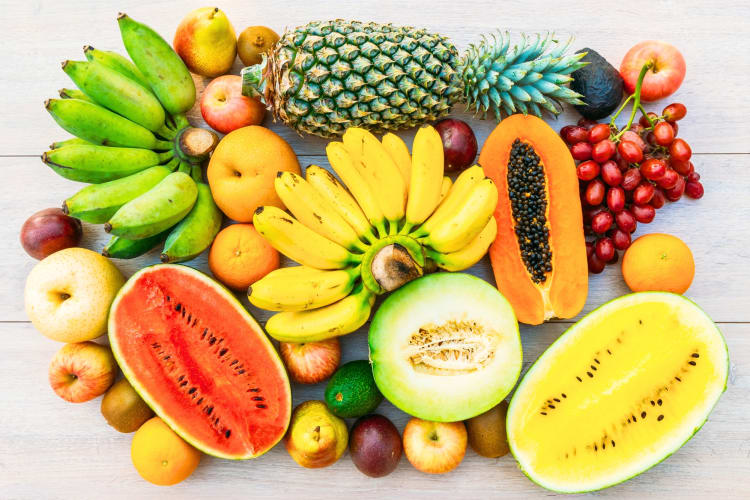
When it comes to eating healthy, adding more fruit to your diet is one of the best things you can do. While you should generally eat fruits in moderation to avoid consuming too much natural sugar, a serving or two a day is a delicious way to get added vitamins and nutrients.
This list of the healthiest fruits should have helped you find the best options for your dietary goals. However, whichever fruit you end up enjoying, you're guaranteed to gain a whole host of health benefits!
For more ways to explore your favorite foods, check out other experiences happening on Cozymeal.
